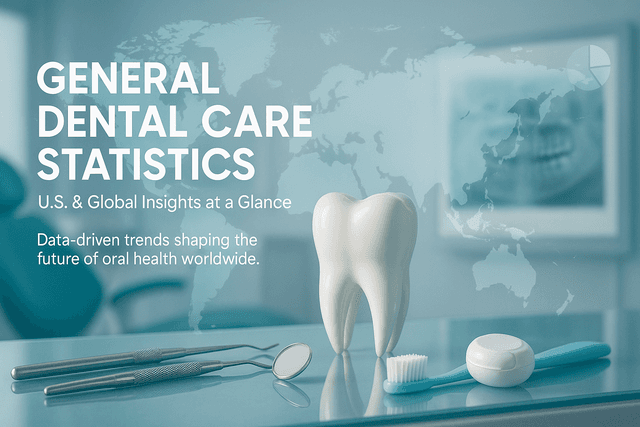Oral Health
6 min read
Jun 30, 2025
How to Stop a Toothache at Night: Safe, Fast, and Simple Fixes
Toothaches have the worst timing, especially when they hit in the middle of the night. One minute you're ready to enjoy some much-needed rest, the next you're wide awake with a throbbing tooth and zero idea how to make it stop. If you’re wondering how to ease the pain and actually get to sleep, you’re in the right place.

There’s something especially cruel about a toothache that strikes at night. You’ve finally crawled into bed, the lights are out, and you’re just about to drift off, then bam. That aching tooth suddenly becomes the star of the show. The pain feels sharper, the throbbing louder, and sleep? Forget it. If you’re reading this while cradling your jaw in the dark, don’t worry. We’ve gathered the safest, fastest, and most practical methods to get rid of a toothache at night so you can actually get a good night’s sleep.
Toothache: Why It Feels Worse at Night
You’re not imagining it, toothaches feel worse at night. There are a few solid reasons for that. First, when you lie down, blood flow to your head increases slightly. That added pressure can make a painful tooth feel more intense. Second, there are fewer distractions. You’re not scrolling through emails or wrangling kids, your brain has nothing better to do than focus on that sore tooth.
Oh, and let’s not forget how dry mouths can make things worse. Less saliva at night means less natural rinsing, and bacteria can start throwing their own little party near the affected tooth.
Dentist or Not? When to Call for Help
Let’s get this out of the way: if the pain is severe, swelling is spreading, or you have a fever, skip the DIY and call a dentist. This could be more than just a sore tooth, it might be an infection, and dental infections aren’t something to mess around with. The right diagnosis and treatment could save you from a bigger problem down the road.
Still, not every toothache at night is an emergency. If you can’t see your dentist until morning (or Monday), there are ways to ease the pain and help you sleep in the meantime.
Rinse Your Mouth First, Yes, Really
The simplest thing? Rinse your mouth. Seriously, this alone might help reduce the pain. Use warm water to gently flush out food particles, bacteria, or anything irritating your gums. If you’ve got it, a salt water rinse is even better. Just stir about half a teaspoon of salt into a glass of warm water. Swish, spit, repeat. It can help reduce inflammation and clean out anything that’s hiding near the painful tooth.
Salt water isn’t magic, but it’s a solid first step and part of every dentist’s go-to home remedies for toothache relief.
Cold Compress for the Win
If the pain is coming from trauma, swelling, or a bruised feeling, apply a cold compress. A cold compress can help numb the area and reduce inflammation. Just wrap an ice pack in a towel (no direct skin contact!) and hold it against your cheek near the painful tooth for 15–20 minutes.
This helps constrict blood vessels, which dulls the pain and reduces that throbbing pressure. A cold compress can help you fall asleep without feeling like your tooth is tap dancing in your jaw.
Home Remedies for Toothache Relief That Actually Work
Home remedies can help bridge the gap between now and your dentist appointment. Some options sound weird but work surprisingly well.
One classic option: clove. Clove oil is a natural numbing agent that dentists have used for ages. Dab a tiny amount onto a cotton swab and press it gently near the aching tooth (avoid swallowing it). Clove can help relieve toothache and may reduce pain and inflammation.
Don’t have clove oil? Chewing on a whole clove gently near the affected tooth can also help. Just don’t go too hard, you’re dealing with a painful tooth, not a piece of gum.
Another tip: prop yourself up. Keep your head elevated when lying down. This helps reduce blood pressure near the tooth, which may help ease the pain enough for you to get to sleep.
Pain Medication: What Helps, What Doesn’t
When home remedies don’t cut it, it’s time to bring in the big guns: over-the-counter pain reliever. You’ve got two main players, ibuprofen and acetaminophen. If your gums are swollen or the tooth is throbbing, ibuprofen may reduce inflammation better. If inflammation isn’t the issue but you still need to dull the pain, acetaminophen is solid.
Always follow the instructions on the label. And if one doesn’t work, don’t mix both without checking with your pharmacist or doctor. That said, if used properly, over-the-counter pain relievers can help you get that night’s sleep you’re dreaming of.
A quick side note: take an over-the-counter pain reliever before the pain spikes. Don’t wait until it’s unbearable. Being proactive can help you sleep longer and more comfortably.
Numb the Pain: Local Solutions
Need something fast? Try a numbing gel made for tooth pain. These over-the-counter gels often contain benzocaine, which can numb the area around the tooth and gum tissue temporarily. Rub a small amount near the sore tooth (read the directions first) and feel the area go blissfully quiet, at least for a little while.
While this doesn’t treat the cause of the toothache, it may relieve the pain long enough to help you sleep or get through the night until your dental appointment.
Why Toothaches Feel Worse at Night (and How to Outsmart That)
We already mentioned why toothaches feel more intense at night, but here’s how to use that info to your advantage. Keeping your head elevated reduces blood flow to the mouth. That can ease pressure on the aching tooth. Also, don’t go to bed right after eating sugary snacks, leftover sugars feed bacteria, and that can cause toothache pain to flare up even more.
And if you’ve got a history of tooth decay or a cavity, keeping your mouth clean before bed is even more important. Bacteria don’t need a party invitation, they’ll find one anyway.
Over-the-Counter Help Can Be a Lifesaver
If the pain is waking you up multiple nights in a row, or your tooth pain is starting to impact your ability to eat, talk, or function, then yes, over-the-counter pain options are your best bet for short-term survival. These medications, combined with home remedies, cold compresses, and a proper rinse, can help reduce the pain enough to make it bearable.
The important part: this isn’t a forever fix. It’s just a temporary relief plan until you can get a professional diagnosis and treatment.
Toothache Troubles: What Might Be Causing It?
Here’s a quick checklist of what might actually cause toothache, especially at night:
Tooth decay or an untreated cavity
A broken tooth or damaged filling
An abscess (infection)
Gum irritation or infection
Something stuck near the affected tooth
Sinus pressure (yep, it can make your upper teeth ache too)
Whatever the cause, your dentist is the one who can give you the appropriate treatment to relieve the pain permanently.
When the Pain Persists, Don’t Wait
If you’ve tried every rinse, every home remedy, and popped every pain reliever in your medicine cabinet (safely), and the pain still lingers, don’t wait. The longer you put it off, the worse it could get. Even if the pain may seem manageable, untreated dental pain can lead to bigger complications.
And if it keeps happening? There’s likely something going on beneath the surface. You may be dealing with a recurring infection, a cracked root, or a deeply buried cavity. Whatever it is, your dentist has the tools to stop the cycle for good.
Final Word
Nighttime pain is no joke. And while these tips can help ease the pain temporarily, don’t let them replace professional care. A toothache quickly shifts from annoying to serious if ignored. Whether it’s a minor irritation or a throbbing tooth that won’t quit, these safe, fast, and simple fixes are designed to help reduce toothache symptoms just long enough to get you through the night.
So yes, home remedies can help. A quick salt water rinse, a cold compress, some clove oil, or a smart use of over-the-counter pain reliever might be all you need to relieve your toothache and finally get that night’s sleep your aching jaw’s been begging for.
But don’t wait too long. Your dentist is your best ally when it comes to treating a toothache, especially one that strikes at night and won’t let go.
Why Do Toothaches Feel Worse at Night?
Toothaches often feel more intense at night due to increased blood flow to the head when lying down, which can heighten pressure and pain. Fewer distractions and less saliva also allow bacteria to irritate the tooth more, making discomfort more noticeable when you're trying to sleep.
What Can I Do at Home to Relieve a Toothache Overnight?
Start with a warm saltwater rinse to clean the area and reduce inflammation. Applying a cold compress can help with swelling, and over-the-counter pain relievers like ibuprofen can ease discomfort. Clove oil or a numbing gel can also provide temporary relief until you can see a dentist.
When Should I See a Dentist for a Toothache?
If your toothache is severe, causes facial swelling, comes with a fever, or lasts more than a day or two, contact your dentist immediately. These may be signs of an infection or more serious dental issue that home remedies alone won’t resolve.
Are Numbing Gels or Temporary Fillings Safe to Use at Night?
Yes, over-the-counter numbing gels with benzocaine and temporary dental repair kits can safely reduce discomfort short term. Use them exactly as directed, and remember, they’re not a cure, just a stopgap until a dental professional can treat the underlying issue
Read Next
Related Posts

Oral Health
What Is Mewing Trend? Origins, Science, and Results
From TikTok tutorials to teen slang, "mewing" has taken over the internet as the latest beauty and wellness craze. But beyond the social media hype, what exactly is mewing, and can it really transform your face or improve your jawline? This curious trend centers on one simple thing: where you rest your tongue.
4 min read
Sep 08, 2025

Oral Health
General Dental Care Statistics (U.S. & Global)
Dental health plays a crucial role in overall well-being, yet millions worldwide face barriers to routine care. This detailed statistics guide breaks down current dental health trends, costs, and challenges both in the United States and globally.
5 min read
Aug 21, 2025

Oral Health
Teeth Whitening Statistics & Trends
Teeth whitening has grown from a luxury procedure to a mainstream cosmetic treatment accessible to people worldwide. Consumers today are investing in their smiles as much as they invest in skincare, haircare, and personal style. Whether it’s for a job interview, a wedding, or just personal confidence, teeth whitening has become a regular part of aesthetic self-care.
4 min read
Aug 21, 2025
Don’t have time to research every dentist around you?
See why 30k+ patients trusted us